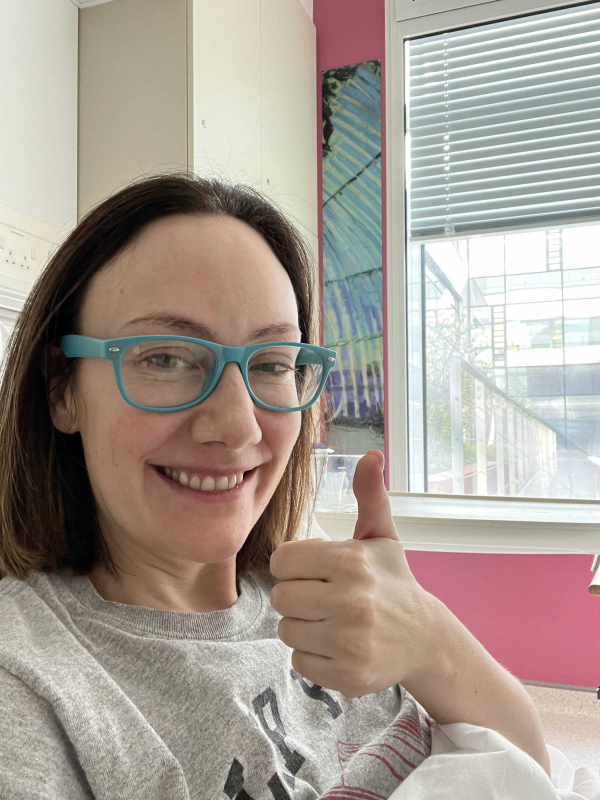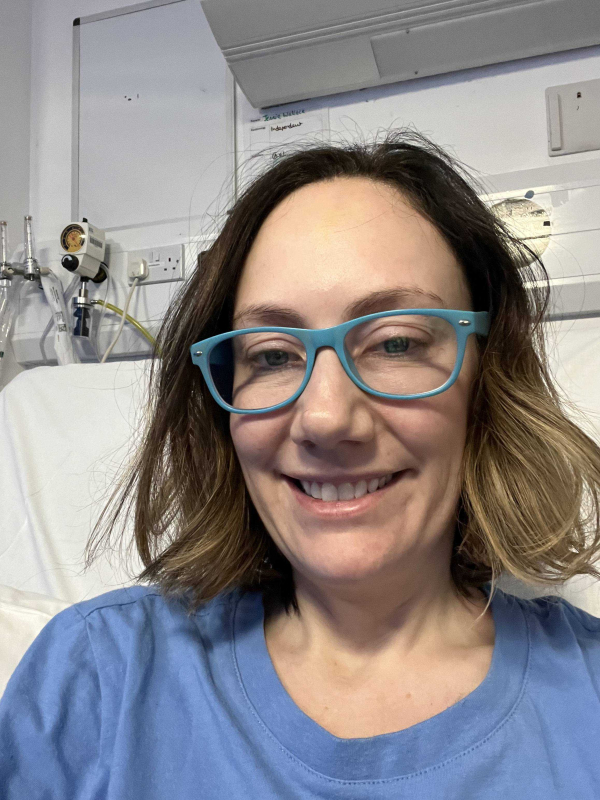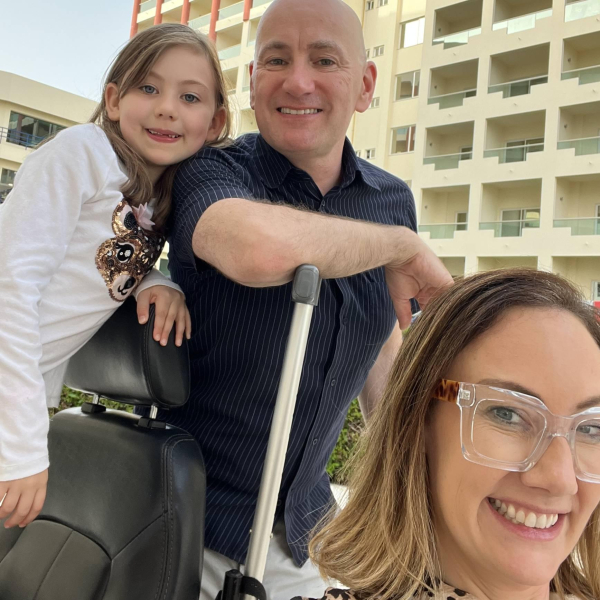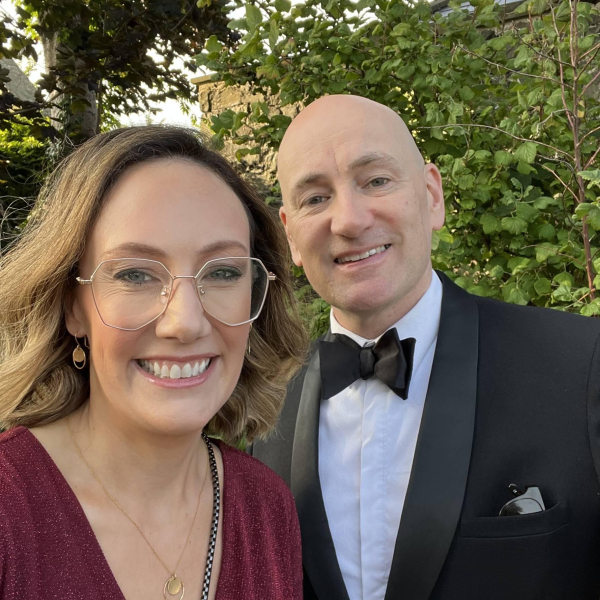
World Stroke Day will be observed on Sunday (29th October) and leading local health charity, Northern Ireland Chest Heart & Stroke (NICHS), is using the day to put a spotlight on this serious, often life-threatening, condition.
Jennie Wallace, aged 42 from East Belfast, was a busy mum and business owner, when earlier this year on the 15th of February her life was turned upside down by an unexpected stroke.
Jennie says, “It was just a very normal day. I was in the shower in the morning when I felt funny, and my balance went. I called my husband, Jonathan, because I knew something wasn't right, and he came up and got me out of the shower. I was lying on the floor and vomiting, and I couldn't open my eyes. He called an ambulance, and paramedics came. I didn't really have the typical stroke symptoms, but they seemed to realise quickly what was happening. I was taken by ambulance to the Ulster Hospital and received the clot busting drug Thrombolysis. I was then taken in another ambulance to the Royal Victoria Hospital for a Thrombectomy which is a procedure to remove blood clots and help restore blood flow to the brain.”
“I was in the Royal for around ten days. Then I came home and started rebuilding my life.”

For Jennie, the stroke came completely out of the blue. “I don’t have diabetes, I’m not overweight, I’m not a smoker. I'm not out doing drugs every weekend or doing anything that would put me at risk of this. I have a pretty normal life. I didn't really know much about stroke before; I don’t have a history of stroke in my family. It was never something that crossed my mind. It was really random and a huge shock.”
Co-owner of Beyond Skin Clinic, a laser and aesthetics clinic based in Belfast, Jennie has not yet been able to return to work and has found the impact of a stroke at such a young age difficult to cope with as an active mum and businesswoman.
She says, “Since the stroke, my left side is still affected. I'm still walking with a stick and my mobility isn't fantastic. I can't walk very far but I can manage. My left arm is not so great, and my shoulder, if anything, has gotten worse over the past couple of months. There are certain movements that are really painful. Cognitively, I'm still a bit slow. I generally operate at quite a high level with running a business- it involves doing lots of things at once, and I can't do that now. It is very frustrating.”
“As a business owner, I've tried to get my brain back into the way of working again. I have found it really difficult. I've spoken to all our staff and explained, physically, it's not viable for me to get into the clinic. It's just not an option. Cognitively, I'm struggling, but I'm trying my best to engage with the staff and show some leadership and try and get back, but I’m finding it very tough.”

“I also have a 7-year-old daughter, Cleo, and it’s so hard when she’s asking me, “Mummy can we go for a walk,” and I have to say, “I'm really sorry, I can’t, my legs are too tired”. I’m just not able. It’s awful, I hate it. The fatigue is a killer. There are things I think I can do, but then I'll be knocked out for three days in bed.”
The mental health impact from the stroke has also been something Jennie has been forced to try and overcome. She explains, “I think I was doing okay in the beginning. I had a really positive attitude and was resilient, and people were amazed at how well I was doing. But I think that maybe I had my head in the sand a bit.”
“I was told that there was a hole in my heart, and I was offered surgery to close it. When I woke up from the surgery, I was told I didn’t actually have a hole in my heart. It took me quite a while to recover from that, because mentally I was okay with the understanding that I had a stroke because I had a hole in my heart; that the doctors would be able to close the hole and I would be okay. That thought pattern was working for me. But then to have gone through the surgery and be told I didn’t have a hole in my heart, and the doctors still don't know why I had stroke, but also that I had gone through needless surgery- it was quite a lot to overcome mentally.”
“After that surgery I struggled quite a bit. I was very, very low with my moods. I was prescribed antidepressants. They are starting to help, now, but it's been tough. Now the consultant has said there’s nothing more they can do for me. They have said they don't know why I had a stroke, they will never know. It's great to know my heart is healthy and fine, but also, it's hard to prevent a secondary stroke because I don't know what happened.”
“I've tried to make peace with it because I don't want to live my life in constant frustration so, I’m kind of having to accept the situation.”
Jennie has found it difficult to find support suitable for her unique situation. She continues, “I was pretty determined to recover. While I was still in hospital, I was looking to see what support was out there. I found some support groups, and I went along but quite quickly I realised those groups were not for me. There were a lot of older people, and many of them just had a different type of lifestyle to me. I'm quite an independent, go getter type of person so to be sitting drinking tea wasn’t really for me.”
“Then Northern Ireland Chest Heart & Stroke (NICHS) reached out and I went along to the PREP (Post Rehab Exercise Programme) group at Lisnasharragh for the physical rehab side of things and I found it to be really useful.”
“When I first went, I was really quite low, and my physical side hadn’t really come on a lot. The NICHS staff were kind, helpful and so encouraging. I was putting in the work and seeing improvements, and by the end of it, my walking had improved so much, my posture improved, my attitude improved. It was definitely the best thing I did in terms of rehab.”
“PREP was good because there was a really wide variety of people there of different abilities, ages and walks of life, but it’s all about your individual progress. You're only competing with yourself. You're tracking your own progress every week.”
“For me, initially, it was about confidence. Being able to sit on a chair without gripping the sides of it, or to stand up from sitting without having to hold the chair. Letting go of things and having the confidence to balance.”
“It also wasn’t necessarily about how fast I could walk; it was about walking with the correct posture. It was also about a better quality of doing things.”
“PREP is a physio-led programme which is great as whenever the problem started with my shoulder Margaret the physio was able to adapt some of the exercises for me to help with that specific issue. It was really useful to have access to someone I could speak to and find out how to do things in the correct way, so it's not to going make things feel worse.”

Jennie says, “Young stroke is on the rise and that’s part of why I want to share my story, to show on social media and in the news that yes, young stroke survivors exist!”
“Having a stroke is a life changing experience. You have to adjust to a different way of life. But recovery keeps going. Just because my shoulder isn't great now, it doesn't mean it will always be like this. I've come quite a long way in six months, so who knows where I’ll be six months from now.”
Ursula Ferguson, Director of Care Services at Northern Ireland Chest Heart & Stroke explains, “We are so thankful to Jennie for sharing her story to mark World Stroke Day and raising awareness of young stroke. People may be surprised to learn that 50% of stroke survivors in Northern Ireland are under 75.”
“Over 40,000 people within our local communities are living with a stroke or TIA, also known as a ‘mini stroke’. As well as the negative impact on physical wellbeing, stroke can reduce independence, confidence and happiness. Stroke can also affect relationships, take away jobs and careers and render some families isolated within their own homes- but NICHS is here to help with expert care and support.”
“The help available from our Care Services team is extensive and, alongside PREP, includes family support, health education programmes, our Wellness Sessions, a Return to Work programme and emotional support.”
“Our team works across Northern Ireland with people of all ages affected by stroke, alongside their families and carers. They are dedicated to supporting people in adjusting to life with a stroke condition, helping them to enjoy life to the full, re-engage with hobbies, and improve their confidence, independence and overall quality of life.”
Ursula continues; “In 2022/2023 we helped 1,042 people affected by stroke through our stroke services. Our care pathway supports stroke survivors on their journey from hospital to home and beyond. As a charity, almost 90% of our income comes from public donations. These funds are essential in enabling us to continue to support the local community and provide life-changing services. Without the public’s generous support, we could not help people like Jennie, and we want to thank them for enabling us to be there for those who need us.”
If you have been affected by stroke visit https://nichs.org.uk/care-and-support/stroke-support for further information about NICHS’s stroke support services.
